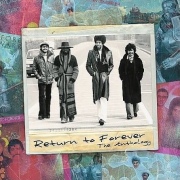 With the temperature dropping, it's time to find someone to keep you warm. Find your hookups with our online dating guide!
With the temperature dropping, it's time to find someone to keep you warm. Find your hookups with our online dating guide!
The Anthology
- Jazz
- 2008
- Buy the CD
Reviewed by Michael Fortes
()
Oh, it’s certainly not unprecedented for bands going out on tour without a new album to promote to have their label issue a compilation to hawk instead. In the case of the recently reunited classic lineup of Chick Corea’s fusion ensemble Return to Forever – bassist Stanley Clarke, drummer Lenny White, guitarist Al Di Meola, and keyboardist Corea – The Anthology takes advantage of a novel hole in the group’s discography. Namely, there was no compilation focusing solely on the classic quartet that existed from 1973 to 1976 (though the short-lived period with guitarist Bill Connors is not ignored).
While restricting the time span covered by The Anthology (not to mention the remix/remaster job done on the tracks) keeps the sound of the collection consistent, it also means that the complete evolution of Chick’s conception of the RTF sound is still nowhere to be found. Even 1996’s double disc Return to the Seventh Galaxy: The Anthology, while including selections from the pre-electric era, failed to take into consideration the group’s final three releases on Columbia. And yet, on The Anthology, the entire contents of the group’s debut Columbia release, 1976’s Romantic Warrior, are present (though the original album itself is still available as a stand-alone disc on Columbia/Legacy).
As for the music itself, the classic RTF quartet distinguished itself from peers like Weather Report and the Mahavishnu Orchestra by remaining consistent with Chick’s interests in European classical and Spanish music, as well as using their sci-fi imaginations to inform their musical themes. The end result was like a jazz version of Yes – heavy on keyboard textures and speedy lead guitar, and a bass voice in Stanley Clarke that was closer to the way a guitarist might approach the instrument.
Much like prog rock, RTF was easy to admire, though not always as easy to love for those whose appreciation for guitar-based bands is rooted in a love of the blues. Unlike John McLaughlin’s Mahavishnu Orchestra, it’s not always easy to feel a blues influence in RTF. Where it can be felt most strongly is in Lenny White’s composition “Sophistifunk,” where, tellingly, Chick’s keyboards act merely as texture, so that Clarke and White can dominate with rhythms that more than live up to the piece’s title, while Di Meola provides both excellent wah wah comping and cutting leads. “No Mystery” offers the other side of the band’s strength – acoustic pieces that drew more strongly upon the group’s jazz pedigree. “No Mystery” is the most memorable of the bunch, with Corea and Di Meola playing the impossibly speedy theme in perfect unison, and contrastingly calm solos from Corea and Clarke.
After this version of the group splintered, a bloated reconfiguration would continue with a brass section in place of the guitar, and vocal parts that were unnecessary at best, and intrusive at worst. Though some good music did come out of the last edition of RTF, clearly there was a chemistry present in the classic quartet that justifies not only The Anthology, but also its accompanying tour. However, two disc’s worth of RTF might still feel like overload, in which case simply sticking with the 1975 album No Mystery will do just fine. Appropriately, though, the CD booklet includes an informative essay by Bob Belden, notes from the four band members, and photos, approximating a tour program for those who skipped out on the live experience.
You can follow us on Twitter and Facebook for content updates. Also, sign up for our email list for weekly updates and check us out on Google+ as well.











